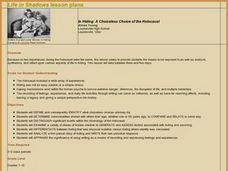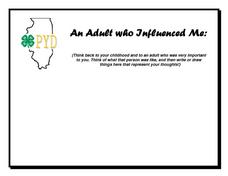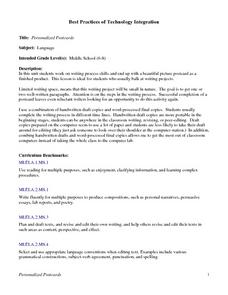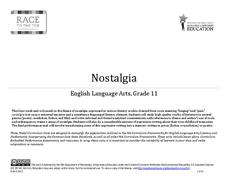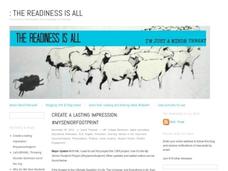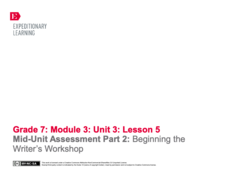Curated OER
Virtual Realities of War
Students outline the major events, mat??riel, and setting of a war or conflict. They develop a computer game narrative that draws on these historically accurate details.
Curated OER
In Hiding: A Choiceless Choice of the Holocaust
Students read various examples of children who lived in hiding during the Holocaust. Using the texts, they identify commonalities between the children and create a timeline of events. They read a first person narrative of hiding and...
Curated OER
The Feudal System: Castles at War
Students study the feudal system of the Middle Ages. In this Middle Ages lesson, students watch "The Feudal System at War". Students listen to an instructor-delivered lecture regarding the roles of monarchs, nobles, knights, and...
Curated OER
Country Comparison Venn Diagram
Fifth graders discuss different countries, their cultures, similarities and differences and choose a set of focus questions to research. They create a narrative story using their researched information in first person narrative stories.
Annenberg Foundation
Exploring Borderlands
What motivated Europeans to explore the New World, and what effects did their exploration have on Native American populations? The second installment of a 16-part American Passages series prompts pupils to watch a video and read several...
Curated OER
Teach About the Holocaust To Prevent Acts of Hate
Invest the time to study personal histories, poetry, and movies about the Holocaust so learners can grasp the plight of the individual.
Curated OER
An Adult Who Influenced Me
Writers are challenged to think back to their childhood, and recall an adult who had an influence on them. They use this simple worksheet to write down their thoughts and images of the person they remember. This would be a good worksheet...
Curated OER
Establishing a Point of View in Narratives
Fourth graders investigate the concept and take the opportunity to both identify and to construct point of view in narratives. Additionally, 4th graders practice identifying and sequencing main events.
Curated OER
In Their Own Words: Slave Narratives
Students identify primary sources, explain the strengths and weaknesses of personal accounts in history, and negotiate the Library of Congress Database. They also analyze documents and write a summary that compares and contrasts the...
Curated OER
Personalized Postcards
Students create and send postcards to friends and family members. Using actual photographs, they write a rough draft and final draft of a paragraph and print it out to glue onto a postcard template to mail to their friend or family member.
Curated OER
Nudging Questions
Students choose one topic to write about. They brainstorm ideas about their topic or incident. They use sensory details to visualize their topic. They answer a variety of teacher directored nudging question to help them describe their...
Curated OER
Telling My Story: Conducting and Writing an Oral History
Students analyze the use of oral history as a way of gathering history. In this oral history lesson, students define oral history and then discuss researching immigration. Students research immigration. Students create questions for to...
Curated OER
Essential Narrative Concepts
Students interact with the main concepts of a narrative text in the six lessons of this unit. The setting, prediction, retelling, sequencing, and the identification of the beggining, middle and end of a story are investigated.
Massachusetts Department of Education
Nostalgia
To prepare for crafting their own memoir, class members examine poetry by Margaret Atwood, Billy Collins, Robert Hayden, and Claude McKay, stories by Richard Rodriquez and Willa Cather, and Barry Levinson's film Avalon. They examine how...
Curated OER
Create a Lasting Impression: #Myseniorfootprint
Looking for some ideas for an end-of-year project for seniors? Here's one that asks seniors to highlight what they learned during their four years of high school.
Penguin Books
Teacher’s Guide: The Diary of a Young Girl The Definitive Edition By Anne Frank
A line from Anne Frank's diary reads, "What is done cannot be undone, but one can prevent it happening again." Indeed, that is the hope for scholars who study her diary. The 19-page guide to the Definitive Edition of The Diary of a Young...
Writer’s Digest Books
The Writing Prompt Boot Camp
Fourteen days of writing prompts (or 16 if you count the two bonus days) are featured in packet designed for high school, college level, or adult writers.
EngageNY
Writing the Children’s Book: Day One
With a brief mini-lesson, scholars learn about using strong verbs, sensory details, and precise descriptions. Next, pupils continue working on their children's book storyboards before choosing their strongest pages for peer critiques.
EngageNY
Mid-Unit Assessment Part 2: Beginning the Writer’s Workshop
Writers learn about using sensory details as they revise bland sentences with more vivid language. Next, they begin writing the first drafts of their children's books, completing storyboards to effectively plan their writing.
PBS
Exploring Identity and Intersectionality in Poetry
Just as Kermit the Frog notes, "It isn't easy being green!" it isn't easy occupying "multiple Identity spaces." Class members read and discuss poems by writers detailing what it is like when their identities are "oppressed."
Automattic
365 Days of Writing Prompts
"If you could un-invent something what would it be?" "What are you more comfortable with—routine or spontaneity?" Here's a packet of one-a-day writing prompts. Although designed for fifth graders, the topics are appropriate for any grade...
Scholastic
Connecting with Ruby Bridges
When Ruby Bridges entered an all-white school in New Orleans in 1960, she also entered history. Scholars consider what the experience must have been like for the young girl using two books that document her experience as well as a double...
Minnesota State University
Writing Sample Constructed-Response Assignment
Class members practice their writing skills by completing a prompt about maturity. They develop a constructed response about something they once thought was important, but may not be as important now.
EngageNY
Grade 10 ELA Module 4: Unit 1, Lesson 4
High schoolers read the final section of E. B. White’s Death of a Pig and examine the impact of the words and tone he used. In pairs, learners discuss their homework from the previous night, answer questions about the text, and write in...
Other popular searches
- Personal Narrative Writing
- Writing Personal Narratives
- Personal Narrative Timeline
- Personal Narrative Time Line
- Writing a Personal Narrative
- Personal Narrative Essays
- Personal Narrative Lessons
- Personal Narrative Organizer
- Personal Narrative Paragraph
- Personal Narrative Guidelines
- Life Map Personal Narrative
- Personal Narrative Prompts



